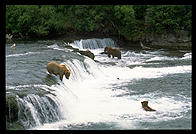
Katmai National Park is home to the world's largest grizzly bears, commonly referred to here as the Alaskan Brown Bear. Because of their rich salmon diet, they grow to over 1000 lb. in weight, making them the world's largest land predator. Brooks Camp, where I stayed, is the overnight home of about 150 people and 20 bears, who live in closer contact with each other than anywhere else in the world. Bears are normally solitary animals, but here they've established a wolflike dominance hierarchy. As many as 15 bears congregate around Brooks Falls to grab salmon as they try to jump over the falls to reach spawning grounds upstream.
Wooden viewing platforms over the falls and a marshy area of the Brooks
River allow tourists to safely spend an entire day 10'-50' from bears
going about their business. Remarkably, most of the bears take little
notice of humans and never make eye contact with visitors. The one
exception I observed was actually the 4-year-old who charged me. He
had been taunted earlier by a German tour group as he paced back and
forth across a pontoon bridge. They hollered and jeered at him in
German until he came underneath the platform to stare us down. It was
chilling to look into his eyes and note his six-inch long claws. As the
park gets more visitation, some of the younger bears like this one are
losing their fear of humans. The Park Service instructs visitors to
always back away from bears so sometimes they apparently learn how much
fun it is to run tourists off trails.
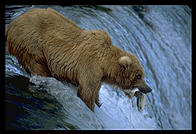
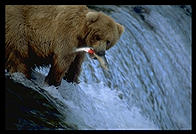
A 737 jet took me over staggering snowfield-covered mountains that
form the Alaska Peninsula, which eventually becomes the Aleutian
Islands. King Salmon is a wart in the middle of some smelly tidal
flats. Fortunately I only had to spend 30 minutes there before
getting in a Twin Otter float plane. I'd read about Twin Otters in
books on Antarctic exploration, but seeing the plane was a surprise.
With wheels under its floats, the plane is as high off the ground as a
727 even though it only seats about 20. Our pilots were clad in
T-shirts and jeans and casually fired up the engines to a roar that
would have been deafening if not for the earplugs I'd brought.
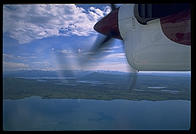
After 20 minutes of flying over Naknek Lake, we touched down on its surface in front of Brooks Lodge. Rather than landing with the expected big splash and thud, the plane came down so smoothly that none of us could tell when we'd hit water. Our pilot taxied back into the beach, and we walked on a float over to the sand. Although Katmai is famous for bad weather and biting insects, the skies were blue and the insects mercifully scarce. Our group of eight passengers was met on the beach by Ranger Barbara, a stern woman with close-cropped grey hair. She gave us a lecture on bears, mostly stressing that we weren't to get within 50 yards of a single bear or 100 yards of multiple bears. It was best to avoid wearing insect repellent, and one shouldn't have anything that smells unusual about one's person or tent.
Ranger Barbara dressed me down a bit for having come here without a campground reservation and told me to go immediately to the visitors' center to get on a waiting list. Once I left the beach, bureaucratic ideas about reservations and schedules became ever more indistinct, and each person I spoke with became ever more sympathetic. Ranger Lisa greeted me with a winning smile and radioed the campground hosts, a benevolent retired couple from Albuquerque, to make sure they had room somewhere for my small dome tent. Lisa, Brandeis Class of `81, turned out to be exactly the sort of nice Jewish girl my mother always wanted me to date but whom I could somehow never find in Boston.
I was sharing my site with Hazel and Heather, two diminutive Scottish scholars with lilting accents. Heather is getting a Ph.D. in Scottish Studies, concentrating on potato cultivation around the turn of the century. Hazel won a travel fellowship to Florence last year and another this year to spend three months in Anchorage. They'd just come back from six days in the backcountry. I was delighted that we were only sharing the site and not a tent; even after six days, they didn't want to pay four dollars for a hot shower and towel at the lodge and had decided to wait until they returned to Anchorage.
Before we could even walk to the campsite, three young bears came tumbling along the beach. They were no more than 30 yards away. One went into the water, quickly caught a 15 lb. salmon, and quietly munched it. Another came into the camp and, just as we were told, we got together in a group and clapped our hands and shouted for him to clear off. The Park Service is trying to condition the bears not to roam around the lodge and the camp. However, there are two brothers and a sister that have remained together for three years. They play-fight and generally raise Hell together and have ignored the accumulated wisdom of the rest of the bears. (These bears were to be constantly in my way during the week, bumming around in front of the lodge when I wanted to go in for breakfast and ultimately charging me on the Falls trail.)
I spent the evening eating a buffet dinner at the lodge and relaxing
at one of the bear-viewing platforms. The sense of community here is
strong. With 60 lodge guests, 60 campers, and about 35 workers,
anonymity is simply not an option. Life here is much as it was back
in the 1940s when the camp was established. Nature has been subdued
with a generator and electric light, the tyranny of the clock has been
imposed upon workers (and guests if they want to eat at the lodge),
and the roar of the float plane is a common daytime sound, but there
are no strangers, no telephones, no RVs, no bus tours, and, until
Samantha's arrival, no notebook computers.
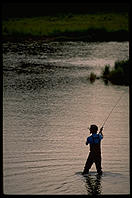
Two kinds of people come to Katmai: (1) photographers who can't understand why a grown man would pay $5000 to fly up here and spend two weeks standing up to his hips in icy water in order to catch and release 20 slimy, silver, flopping salmon; and (2) fishermen who can't understand why anyone would lug 50 lb. of equipment one mile and then sit all day taking Pictures #1,437,213 through #1,437,896 of the Katmai bears.
Photographers come here well-equipped. Under ordinary circumstances, the status-conscious might look to see what kind of camera you have. Not here, where all the lenses are so big that even a Nikon F4 looks like a child's toy after it is bolted onto the end of a tripod-mounted lens. Henry's 300/2.8 lens didn't cause any mouths to drop here. Any time I had company on a viewing platform, another photographer had a lens at least as big connected to a $400 Swiss ballhead. The only difference between the pros and the amateurs was that the pros' lenses had scratched barrels and their tripods were much sturdier. I'd never seen anyone old or female carrying a "big lens" before. Well, at Katmai, even the old and female carry them.
Famous wildlife photographers Art Gingrich and Mike Lacey happened to be here leading a Van Os luxury photo-safari. Most of their charges were medical doctors toting beautiful $4000 month-old all-white Canon lenses. One of them looked just like Bill Clinton, and he wasn't pleased to hear it. Not only was he a diehard Republican, but Hilary's plan to trim the sails of radiologists such as himself enraged him.
"What business does the government have interfering with the free market in medicine? We should be able to charge whatever we want," he insisted.
Didn't he think that the government's shelling out 50% of the nation's health care dollars through Medicare and Medicaid already made the market less than free?
"That's different."
My favorite photographer at Katmai was Dave, a 78-year-old New Yorker.
He'd been here numerous times and thought that it had been ruined by
tourists, for whom he had a healthy contempt. Dave had been sent on
assignment to Africa about 40 times since 1960. He had trouble with his
eyes now and was reduced to using autofocus; he needed me to help him
with his Nikon 8008 out on the Brooks Falls platform. Dave never had
children of his own but, at age 49, married a woman with five sons. He
simply did not love his fellow man and referred contemptuously to our
22-year-old waitresses as "cupcakes." In some ways I wanted to be like
Dave. I want to be flying to Africa and Katmai at age 78, carrying my
own 300/2.8, Nikon, and video camera. But I think I'd better have some
children lest I end up calling even the offspring of bears
"brats."
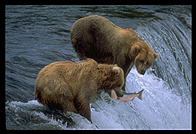
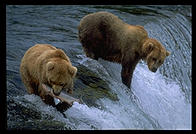
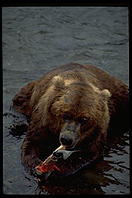
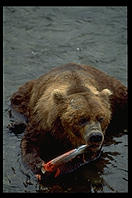
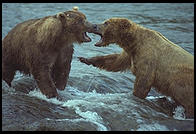
A great picture at Brooks is of two bears fighting for a prime spot.
They roar at each other with a terrifying force, then bite and hit
each other with astonishing speed for 300-1000 lb. animals. Without a
motor drive, a lot of film, and some luck, it would have been
impossible to get a picture of one bear cuffing another. By the time
I saw a bear's arm raised in anger and pressed the shutter release, the
arm had already struck the other bear and come back down. Quite a few
bears wore substantial reminders of battles past.
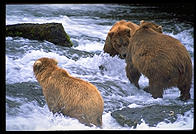
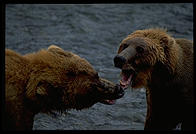
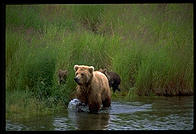 A more pastoral great picture would be of a sow and her cubs. Big
boars will kill cubs, even their own, so the sow keeps her cubs well
away from the falls and the thousand pounders. She protects her cubs
aggressively from humans as well as teenager bears. One of my
happiest moments was seeing the sow charge the bear that had charged
me. The look of terror on his face as he scurried away was well worth
the trip to the platform that day.
A more pastoral great picture would be of a sow and her cubs. Big
boars will kill cubs, even their own, so the sow keeps her cubs well
away from the falls and the thousand pounders. She protects her cubs
aggressively from humans as well as teenager bears. One of my
happiest moments was seeing the sow charge the bear that had charged
me. The look of terror on his face as he scurried away was well worth
the trip to the platform that day.
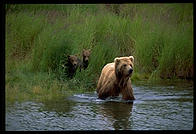
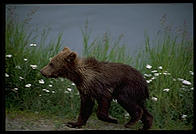
This was not the limit of my vindictiveness. When the big boars were
sated one day and lolling about in the grass, my mischievous friend took
a prime place on top of the falls. His inexperience meant that he
didn't catch any fish even though many actually hit him in the face.
Just call me Captain Ahab, for I waited a full half hour for a big bear
to surprise him from behind and send him flying over the falls. When
the big boar showed up, though, my antagonist simply scurried off
upstream.
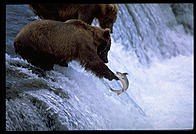
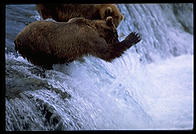
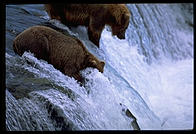
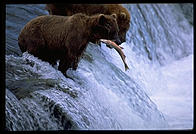
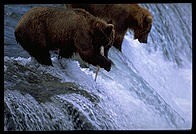
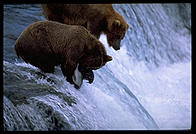
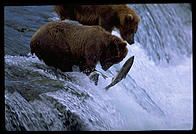
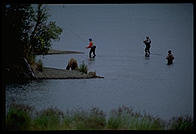 You can't expect a lenshound to give you a fair portrait of the
fishermen guests, but Roland was one of my favorites. Roland was a
solid balding 55-year-old from Sacramento with seven children and 18
grandchildren. He retired from the contracting business because he
found state government red tape too intrusive. Now he works for
Deseret Industries, an arm of the Mormon church, "rehabilitating
bicycles, appliances, and people." County social workers send people
who are handicapped, poor immigrants, or down on their luck to Deseret
Industries. Newcomers are given a place to stay for a year and a
minimum-wage job. People such as Roland supervise and train them in
how to be a good cog in the American Economic Machine.
You can't expect a lenshound to give you a fair portrait of the
fishermen guests, but Roland was one of my favorites. Roland was a
solid balding 55-year-old from Sacramento with seven children and 18
grandchildren. He retired from the contracting business because he
found state government red tape too intrusive. Now he works for
Deseret Industries, an arm of the Mormon church, "rehabilitating
bicycles, appliances, and people." County social workers send people
who are handicapped, poor immigrants, or down on their luck to Deseret
Industries. Newcomers are given a place to stay for a year and a
minimum-wage job. People such as Roland supervise and train them in
how to be a good cog in the American Economic Machine.
"Social workers try to help them with psychological problems, but we
don't make any attempt to convert anyone to the LDS church. We all
get paid a moderate wage, but the money doesn't come from the church
or the state. We get pretty good raw materials donated by
Californians of all faiths, so Deseret Industries is entirely
self-sufficient."
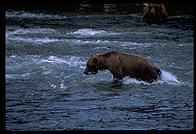
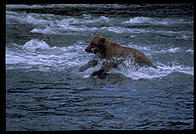
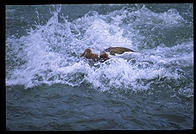
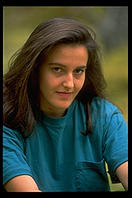
Emma, the most attractive of the "cupcakes" both inside and out, was a 24-year-old Italian-American from Rochester. Upon arrival at the camp, her ambition to learn French over the summer earned her nearly unanimous ridicule. Other staff were afraid that she'd come away with a tangible accomplishment and they'd have to feel like intellectual bums. Whenever I moved Samantha from her charging perch in the lobby--there are no locks in Brooks Camp and nobody thinks twice about leaving thousands of dollars of equipment lying about in a public place--howls of outrage were raised.
Steve, a bearded 45-year-old hippie/mountain man, was a typical anti-computer protester.
"I'm still recovering from the misfortune of growing up in the Lower 48."
New York?
"Montana."
Is the culture really that different?
"Fences. Fences and welfare-ranching and welfare-farming. The parks there aren't wilderness; they are museums. Even this place is a museum, but the wilderness isn't far away."
What's so bad about bringing a computer into the wilderness anyway?
"A person couldn't possibly be himself with a computer."
But I'd written a 75-page diary since leaving Boston. I could never have done that with a pen.
"I write 75 pages in three days with a pen."
... and I grew up in a shoebox in the middle of I-95, worked 30 hours/day, was murdered in cold blood by my father every night, and still managed to write a 2000-page best-selling novel every week in my spare time.
Emma sagely noted that "these guys are really reacting out of fear. They don't have the skills to make it in the yuppie world and are a bit afraid of a peripatetic life of low-paid service jobs in various resorts."
As it happens, I wasn't the only PowerBook addict in camp. Ted Kerasote, a writer for Sports Afield and Outside magazines, was here writing about bear management. We happened to be sitting next to each other around the lodge fireplace and he'd already heard all about me.
"You must be that guy from Boston."
Ted beautifully illustrated the mellowing effect that living in a Wyoming town of 90 for years can have on someone born on the Lower East Side. In a patient soft voice, Ted summarized his new book Bloodties, about animal rights and hunting.
"Hunting in one's bioregion can be ecologically more sound than being a supermarket fossil-fuel vegetarian, i.e., someone who has plugged into America's factory farm system, which has destroyed so many different types of wildlife. Remember that the wheat field used to be a buffalo range, pesticides kill animals, and combines kill all kinds of small animals. Exploration for the oil that powers the combines and makes the pesticides displaces and kills animals."
What about Prudhoe Bay? It is only a 250-square-mile outpost on the Arctic Ocean and produces all of Alaska's oil. With millions of square miles of identical wilderness all around, how could this tiny settlement make a difference?
"Good point, but think about the Dalton Highway that was built to service Prudhoe Bay. That opened up those millions of square miles of wilderness to hunters who go in and kill moose and wolves.
My book calculates the fossil-fuel cost of different diets. A guy in Wyoming expends 79,000 K-calories to shoot 150 lb. of elk meat. The equivalent amount of Idaho potatoes costs 150,000 K-cals. Rice and beans from Northern California 477,000 K- cals."
That's great, but I hadn't seen too many elk roaming around my Boston suburb, whereas we are well-supplied with supermarkets. Can a significant number of Americans really live off game?
"There are more white-tail deer now than when Columbus landed because the forest has been opened up and they flourish on the edge of timber land."
Reviews of Ted's book spoke volumes about the difference between East and West coasts. The New York Times review read much like this synopsis, focusing on his argument and its numerical underpinnings. The Los Angeles Times review started and ended with a discussion of the similarities between hunting and sex.
Janet, Ted's companion from Wyoming, described herself as a "shaman." I asked if she had a day job also.
"Being a shaman is my day job. I make a living healing everything from a broken hip to a broken heart."
She looked at the picture of George that I carry in my wallet longer than anyone ever had. She must have stared sympathetically for a full minute before speaking.
"A dog's job is to teach us about love."
Who gave them that job?
"Everybody has a service."
Traveling alone is great when one wants to be schedule-free, but walking around alone at Brooks can be a bit unnerving. Ever the night owl, I was generally the last to leave the Falls viewing platform at night, usually around midnight.
"Don't hike in groups of fewer than four. Don't wear insect repellent. Don't hike after dark because that is when the bears that aren't comfortable with people come out," said the rangers.
My second night there was pretty typical. I was alone, wearing 100% DEET, and at 10:30 darkness was gathering in the thick woods.
As I crested a hill, a 900 lb. boar lifted his head out of the grass and sniffed the air. He was no more than 15 feet from me. I backed away talking quietly and he didn't get up, pursue me, or even look at me. I bushwhacked around through some tall grass and managed to reach the platform without further incident. By midnight, the light had faded too much even for the video camera I'd brought so I started hiking back to camp. Thick clouds made it much darker than the previous night and I could barely distinguish trees from bears on the first half-mile of narrow trail.
I was glad to get to the road for the last half-mile of my walk, but
soon had an eerie feeling about a vague shape 50 yards off.
Depressingly soon, I confirmed that it was in fact a bear facing me
end-on, but I couldn't tell whether he was walking towards me or away
from me. He grew larger and larger, lending credence to the "walking
towards" hypothesis, then veered off into the woods on the right side of
the road. I walked along the left edge of the road and sang Stephen
Foster songs. The next night I was charged.
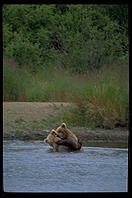
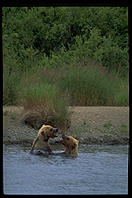
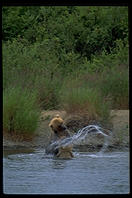
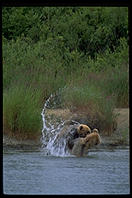
"I grew up in Colorado and went to Brandeis because I wanted to be with other Jews. However, I quickly discovered that I didn't like East Coast JAP culture. And Jewish men are ridiculously spoiled by their mothers. It took five months in Israel to restore my Jewish identity. Still, I haven't dated a Jewish guy for the 11 years I've lived in Alaska, something my parents weren't too pleased about."
I offered Lisa my standard theory of why American Jews can't get along. Naturally I think of Jewish men as wonderful souls who are willing to dedicate themselves to their wife and kids. If they only dated Jewish women, they'd just select their favorite and that would be it. However, American Jewish men date both Jews and non-Jews. They can't help noticing that their non-Jewish girlfriends are grateful for the good treatment and that the Jewish ones accept it as their due.
"I think Jews of both sexes, but especially men, are spoiled and used to having their way, which makes it hard for them to get along with anyone as stubborn as themselves," Lisa concluded.
We walked out to the viewing platform talking about literature, music, philosophy, and our life histories. It was a real pleasure to talk with someone thoughtful, well-educated, and absolutely direct. Other dates I'd been on seemed like shams by comparison: two people playing roles, each pretending to be what he or she imagines the other person wants. I wondered how could people get to know each other if they were acting. I questioned whether I'd ever been 100% frank with girlfriends or vice versa and, if so, how long it had taken to get to that point.
Lisa didn't miss too much about city life and found that even Anchorage (pop. 200,000) was now too large for her taste. The ever-present possibility of a new start with new people in the city didn't entice her.
"I've adapted to life in small towns or this tiny park. It's a fish
bowl, but I can deal with that. I just never do or say anything that
I'm ashamed of."
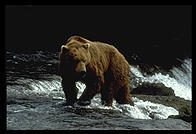
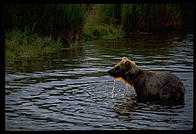
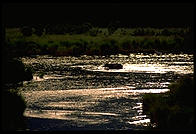
"The more I look at these bears and their simple lives, the more I am convinced that there is something wrong with the way we live."
My response underscored the gulf between us and the fact that two months on the road isn't sufficient to erase an East Coast Type-A personality.
"I was just thinking that these bears lead completely worthless lives.
They sleep half the year, then stand in a stream eating salmon the other
half. What's the point?"
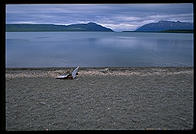
Life in Paradise has to end sometime and that sad morning broke clear
and cold. The Twin Otter appeared out of a distant fogbank and splashed
into the beach. Wayne, the trim young pilot, helped me haul my 150
lb. of luggage down the beach and we soon arced over the lodge and the
falls before climbing into the clouds. I never did get to see the
Valley of 10,000 Smokes, where the 1912 eruption blew the top 6,000 feet
off Mt. Katmai, so I'll have to return. I told Wayne how much I envied
him his job, but he feels shackled to it.
"If I didn't have a wife and kids, I'd go back to school and prepare myself for some other kind of work."
The grass is always greener.
In King Salmon, I had a nice reunion with two Swiss-German couples, medical doctors whom I'd met in Fairbanks. Meanwhile my mouth had a good reunion with some of their sandwiches -- I was getting pretty good at bumming food from the better-prepared. One of the wives, a dark-haired Italianate beauty, graciously switched the conversation from German into her perfect English.
"Europeans are fools, by and large. They leave their carefully selected group of educated friends back home and go into a McDonald's in Kansas. Wow! The workers there aren't as educated as their friends back home. So they go home and declare that Americans are morons.
"What I like best about Americans is that they are delighted to encounter each other abroad and invariably stop to chat. When Swiss meet other Swiss in foreign countries, they take pains to avoid having the strangers recognize them as Swiss."
Touching down in Anchorage, I felt a twinge of lost innocence and community. Oh, I was anxious to get to Photo-Wright's, with its $300,000 dip-and-dunk slide film processor. I thought of the new adventures awaiting me on the Kenai Peninsula. Ethnic restaurants beckoned. I appreciated the classical radio station (KLEF, far better than Boston's) and the well-stocked bookstore/cafe. Telephones would connect me to my friends.
Would it really have been crazy to abandon my car at the Anchorage airport and stay in Paradise?